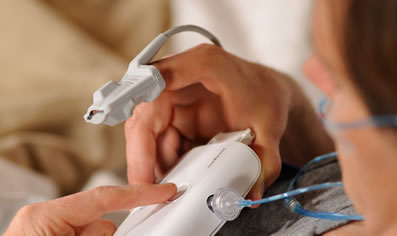Questions? We have ANSWERS!
At Comprehensive Sleep Center we want you to be as informed and comfortable as possible. Please check out the following Frequently Asked Questions for more inforamtion.

At Comprehensive Sleep Center we want you to be as informed and comfortable as possible. Please check out the following Frequently Asked Questions for more inforamtion.

You arrive at the sleep center in the evening for polysomnography and stay overnight. You may bring items you use for your bedtime routine, and you can sleep in your own nightclothes.
The room where polysomnography is done is similar to a hotel room, and it's dark and quiet during the test. You won't share the room with anyone else. Each room has its own bathroom.
The sleeping area will typically have a low-light video camera, so the polysomnography technologists monitoring you can see what's happening in the room when the lights are out. It also has an audio system, so they can talk to you and hear you from their monitoring area outside the room.
After you get ready for bed, one of the technologists will place sensors on your scalp, temples, chest and legs using a mild adhesive, such as glue or tape. The sensors are connected by wires to a computer, but the wires are long enough to let you move around in bed. A small clip also is placed on your finger or ear to monitor the level of oxygen in your blood.
While you sleep, a technologist monitors your:
Polysomnography technologists monitor you throughout the night. If you need assistance, you can talk to them through the monitoring equipment. They can come into the room to detach the wires if you need to get up during the night.
During the study, the technologist may have you try a positive airway pressure (PAP) machine for sleep apnea. This is a device that consists of a tight-sealing nosepiece through which a gentle stream of air is delivered to enhance your breathing.
Continuous positive airway pressure (CPAP) is one type of PAP machine. CPAP devices deliver a constant stream of air that keeps the airway passages open while you sleep. For some people, bi-level positive airway pressure (biPap or bPap) machines may be a more comfortable choice. These devices deliver more pressure while you're breathing in, and lower pressure when you exhale. You may have the opportunity to try on a PAP device before the sleep study begins so that you are not surprised by it if the technologist suggests you try the device later in the night. If necessary, oxygen also may be used during the study to bolster your breathing.
Although you probably won't fall asleep as easily or sleep as well at the sleep center as you do at home, this usually doesn't affect the test results. A full night's sleep isn't required to obtain accurate polysomnography results.
After polysomnography In the morning, the sensors are removed, and you may leave the sleep center. You're given an appointment for a follow-up visit with the doctor who recommended the test. You can return to your usual activities after polysomnography.
At Comprehensive Sleep Center we never want the cost of healthcare to prevent you from seeking the diagnosis and treatment you need. If you have financial questions or concerns, please contact us. We’ll be happy to address your concerns on an individual basis.
Insurance Coverage Patient Forms